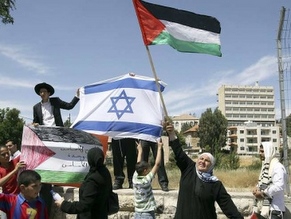|
World Jewish News

Israeli Arabs next to Israeli Jews holding national flags, Jerusalem, May 15, 2010 Photo by: Reuters
|
Secret EU paper aims to tackle Israel's treatment of Arab minority
16.12.2011, Israel and the World The European Union should consider Israel's treatment of its Arab population a "core issue, not second tier to the Israeli-Palestinian conflict," according to a classified working paper produced by European embassies in Israel, parts of which were obtained by Haaretz.
This is an unprecedented document in that it deals with internal Israeli issues. According to European diplomats and senior Foreign Ministry officials, it was written and sent to EU headquarters in Brussels behind the back of the Israeli government. Other issues the document deals with include the lack of progress in the peace process, the continued occupation of the territories, Israel's definition of itself as Jewish and democratic, and the influence of the Israeli Arab population.
The original document also included suggestions for action the EU should take, but these were removed from the final version at the insistence of several countries.
Among these were the suggestion that the EU file an official protest every time a bill discriminating against Arabs passes a second reading in the Knesset, and that the EU ensure that all Arab towns have completed urban plans, "with each member state potentially 'adopting' a municipality to this end."
The contents of the 27-page report were kept under wraps, and a number of European diplomats contacted by Haaretz over the past two weeks refused to disclose any details. Foreign Ministry officials said they had heard about it unofficially from some European diplomats a few weeks ago, but to date no Israeli official has been able to obtain a copy.
According to a European diplomat involved in drafting the report, work on it began more than a year ago at Britain's initiative. The idea was to write a report that could be debated by a forum of EU foreign ministers. At some point, however, several countries, among them the Czech Republic, Poland and the Netherlands, expressed objections to its contents.
After lengthy debates on the issue in an effort to obtain the consensus necessary to send the report to Brussels, it was decided to water it down somewhat and drop the operative conclusions. It was also designated a "food for thought" document, rather than a "report."
The embassies declared in the document that the breakdown in the peace process was having a negative impact on the integration of Israeli Arabs into society.
"The stalemate in the peace process, and the continuing occupation, inevitably has an impact on the identification of Israeli Arabs with Israel," the document states. "It will be more difficult for Israeli Arabs to be wholly at ease with their identity while the conflict with the Palestinians continues."
At the same time, the embassies said this should not be used as an excuse for "hostile behavior by Israeli Arabs which alienates the Jewish majority, or for failure by Israeli government to achieve genuinely equal treatment of Israeli Arabs."
The document suggests that the EU discuss Jewish-Arab relations with the Israeli government, while stressing the government's obligation to bridge the gaps between the Jewish majority and Arab minority.
"We should emphasize that addressing inequality within Israel is integral to Israel's long-term stability," the document says.
The document also relates to the demand made by Prime Minister Benjamin Netanyahu to recognize Israel as a Jewish state.
"We do not believe that recognition of Israel as a Jewish State should detract in any way from the vision of equality for all its citizens enshrined in its founding documents," the report says.
"It is in the interests of all Israelis to demonstrate that Israel is not only Jewish and democratic, but tolerant and inclusive, and that these are patriotic values. We believe in common with most Israelis that Israeli nationality is an inclusive concept which can accommodate equally those of other faiths and ethnic origins."
Other operative suggestions that were dropped from the final document included supporting projects promoting coexistence in schools, and encouraging European companies setting up high-tech operations in Israel to invest in Arab areas.
In response to Haaretz's report, the EU said on Friday that "a core task of any diplomatic mission is to report back to its headquarters on developments in the host country. In this regard, as part of the EU foreign policy process, the embassies of the EU Member States and the EU Delegation cooperate closely."
"This report was prepared to stimulate thinking at the EU level on how the EU might engage constructively with governmental and non-governmental interlocutors in Israel with respect to an issue that has been identified in the EU –Israel Action Plan as a shared value, namely to 'promote and protect rights of minorities, including enhancing political, economic, social and cultural opportunities for all citizens and lawful residents,'" the EU press office added.
Haaretz.com
|
|
